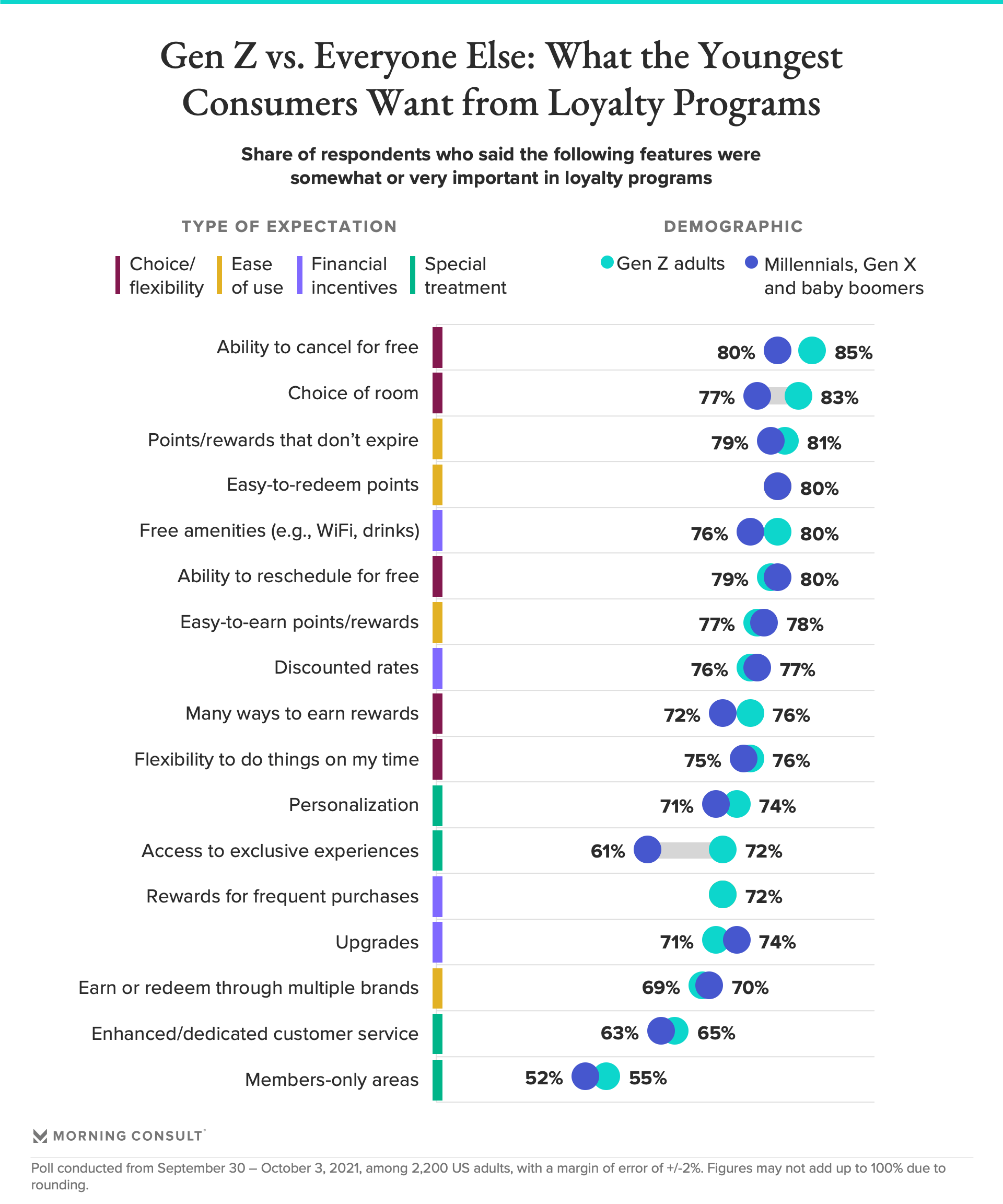How Hospitality Brands Should Rethink Loyalty Programs to Win Over Gen Z

Gen Z represents a huge opportunity for hotels, but as relatively new decision-makers in the category, their awareness of loyalty programs is low, and those who are members are less brand-loyal than older consumers. To win over the next big faction of travelers, hotels need to embrace what makes Gen Z unique: their desire for exclusive experiences from rewards programs.
Loyalty is up for grabs in hospitality. As more consumers return to regular travel, hotel brands need to re-engage their loyalty program members — with a particular eye toward Gen Z, a new but quickly growing target demographic for hospitality.
Awareness of hotel loyalty programs low among Gen Z
With its oldest members just 24 years old, Gen Z is relatively new to the travel category, at least in terms of making purchasing decisions. As a result, their awareness of major hotel loyalty programs — Hilton Honors, IHG Rewards, Marriott Bonvoy and World of Hyatt — is much lower compared with other generations. But while fewer members of Gen Z consider themselves the primary planner when it comes to their leisure travel, 80 percent say they have some responsibility in the process. This share will only grow as Gen Z continues to gain spending power, so the time is ripe for hospitality brands to engage them.
Gen Z Less Aware of Hotel Loyalty Programs
Hospitality brands must overcome a lack of trust and purchase intent
Lack of awareness among young travelers isn’t the only barrier hotel brands face. Among those who are members of loyalty programs — 31 percent of Gen Zers, 41 percent of Gen Xers and 46 percent of both millennials and baby boomers, there’s also a lower level of trust of, and intent to purchase from, the associated brands.
While Gen Z exhibits comparatively low levels of trust across all major institutions, brands can view this lack of trust as an opportunity rather than simply accepting it as a given. Reimagining loyalty programs to align with Gen Zers’ unique needs and expectations can help build trust and translate program participation to purchase intent.
Gen Z Members of Loyalty Programs Exhibit Lower Trust, Intent to Purchase
Gen Z prioritizes choice, flexibility and exclusive experiences in loyalty programs
For all travelers, the wish list of loyalty program perks is long. Roughly three-quarters of travelers say eight features are important to them when considering a hotel loyalty rewards program.

The order of Gen Z’s must-have features doesn’t vary widely compared with other generations, but there are some unique differences that hospitality brands should act on. As relatively less frequent travelers, Gen Zers care less about some of the purely financial elements of loyalty programs — such as free amenities, upgrades and discounted rates — and instead prioritize choice and flexibility.
The biggest difference between Gen Z and all others has to do with access to exclusive experiences. This generation-specific expectation represents an opportunity for brands to get creative — by inviting members to unique events at their destination such as dinners and performances, for example, or connecting them with chefs and creators to enhance their experience. For brands already offering such incentives, understanding Gen Z priorities can help them inform messaging hierarchy when targeting the youngest generation of travelers.
Lindsey Roeschke is an analyst whose work focuses on behavior and expectations of consumers in the travel & hospitality and food & beverage categories, particularly through a generational and cultural lens. Prior to joining Morning Consult, she served as a director of consumer and culture analysis at Gartner. In addition to her research and advisory background, Lindsey has more than a decade of experience in the advertising world. She has lived and worked in seven cities across four continents.